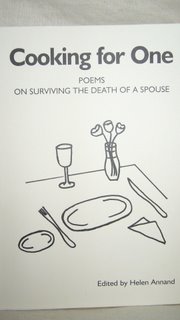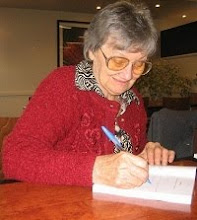Matt first noticed her when she paused at the shore's edge, silhouetted darkly against the setting sun.
It looked like a scene from a glossy magazine.
The next evening, he saw her there again. She wore jeans, a windcheater and a beret set at a jaunty angle. The weather had turned chill after yesterday's heat.
The third evening, Matt positioned himself on a seat close to where she walked. When she came level with him, he saw she wasn't as young as he had thought.
She had been a fashion model, she told him later. They sat on the beach, drying in the sun after a swim. She even had a model name - Krystina. Her parents had come from some eastern European country.
He kissed the faint lines at her eyes. "I love you. You know that, don't you?"
She laughed. "You're only a boy." He heard the tinge of her parents’ European accent.
"I'm thirty-five."
"And I’m fifty. Old enough to be your mother."
"A very young mother." He wanted to push her onto the sand and make love to her.
"Look at the poor seagull." She pointed to where a man and a woman distributed breadcrumbs to a flock of hungry gulls. "It has only one leg."
He glanced at them. The bird hopped on its one leg as nimbly as its companions ran on two.
"It made Bernard mad when he saw people feeding the gulls. He said it caused them to multiply artificially. He even complained to the people who fed them. Do those people look like tourists or locals?"
The tourists and locals didn't interest Matt, but Bernard Melson did. He had died last year aged eighty. "How long were you married to Bernard?"
"I had turned twenty-two when we first met."
Matt did the sums. Bernard would have been fifty-two then. He tried to imagine Krystina at twenty-two. "I wonder if you were more beautiful then than you are now."
She laughed. "You can see what I looked like if you go to the Louvre. A painting that Bernard did of me hangs there. I wouldn't like to guess its worth now. It made Bernard furious when his paintings went up in value after he'd sold them."
"He should have been pleased. His future paintings would increase in price too."
"So I told him, but he was illogical in some ways."
"Tess, my wife, painted a bit. Flowers and things. She didn't have the genius of a Bernard Melson."
"Where is your wife?"
"She died in a traffic accident six months ago."
Her hand clasped his. "Oh, my dear. I'm sorry."
"She was four months pregnant. It's strange that Tess and Bernard died on the same day. One eighty and the other twenty-five."
"I'm sorry for Tess. She had all her life before her."
"Bernard would have kept painting his masterpieces."
"He didn't paint at all in his last years." She rose to her feet, shaking her sarong free of sand before wrapping it around her.
They strolled along the shore towards her house, which had once belonged to Bernard. Later they sat on the verandah, drinking bourbon and coke. "I love you," he said.
"I love you too, but you're too young."
"I'm not after your money. I earn a good salary, not in Bernard's class, I admit, but adequate." He examined her hand. It had lost its youthful firmness, but was elegant like her. "Why did you marry a man thirty years older than you?"
"You wouldn't ask if you knew Bernard then. He was witty and clever and knew all the smart people. I only had my beauty."
He wondered why he should be jealous of a dead man. "You were born with your beauty as Bernard was with his talent."
"Ah, but beauty wanes while talent develops and grows." She placed her empty glass on the cane table. "I was Bernard's third wife. His other wives were beautiful too, but their beauty faded. I survived because he became too old for beauties."
Matt leaned over and kissed her, feeling her warm body through the thin sarong. "You won't be able to say that about me."
"You might say it about me." In one graceful movement she stood above him. "Why don't you make a salad while I have a shower? The makings are in the fridge."
He had the salad made, the table set and opened the bottle of Riesling he had brought and chilled in the fridge.
She returned, smelling of violets in spring. "When are you returning to work?"
"I don't know." He didn't tell her his bosses had expected him back last week. They were good to him. He supposed they valued his services. They said he had a fine future in architecture and had given him time off to recover from his loss. "I might retire from work and become a beachcomber."
She laughed. "You'll have to give up your expensive motel room."
"I'll move in with you and become your gardener." He tried to joke, but he had become too serious.
"That's what I did to Bernard, only I became his model."
"Are you sorry you didn't have a younger man?" Like me, he wanted to add.
"The first twenty years were fun. There were all sorts of famous people: artists, musicians, writers, even politicians, who wanted to be seen with and be painted by Bernard. The last ten years were awful. When Bernard turned seventy, he seemed hardly different from at fifty. I was older too, then at seventy-two, Bernard's heart disease showed up."
"What happened then?"
"He realized his mortality like the rest of us. His health became his only concern and made him into the old man he was. His eyesight became poor and he couldn't see to paint or didn't want to see." Her expression tightened and she drank from the glass of Riesling. "The last twelve months, he spent in a wheel chair to conserve his strength. I think it killed him the quicker."
"You had to look after him?"
"With a nurse. Money helps." She grimaced. "But there were no trips abroad and scarcely any visits from his friends. He'd become impossible, you see. Just an old man sitting in an overheated apartment, trying not to die. I think I began to hate him. The nurse had her time off, but I was stuck with him. Do I sound ungrateful?" She glanced at him.
He kissed her. "Bernard lived too long. He should have died at seventy, then your memories would have been pleasant ones."
"Poor Bernard. Was he to die ten years earlier to make me happy?"
"I would do anything to make you happy. Marry me, Krystina."
"I feel tempted." Her eyes gleamed in the lamplight. She glanced beyond him to the sea. "Look, there are two ships passing each other. I wonder where they're going?"
"The southbound one might call in at Fremantle."
"And the other one?"
"To ports north and other mysterious places!"
She took his hand. "I wonder if they'll pass each other again."
* * *
He left her house at four o'clock and jogged along the sands in the bright moonlight to the motel.
The next morning, the desk clerk handed him a letter, addressed in her scrawling handwriting. He opened it. "We had a lovely time, my dear," the few words read. "I'll always remember you."
He ran to her big house. The door was locked and her car had gone.
Two weeks later, he established she had left the country.
* * *
His firm had employed another young architect while he was away. Bright and sharp and on her way to the top, Judith Scott soon had him married and in a house with four bedrooms, two bathrooms and a mortgage. He didn't have time to think about Krystina. In fact, he forgot about her for long tracts of time. There were the children. Judith wanted to keep on with her job, so they employed a nanny and a woman came in to clean and cook the evening meal.
Eight years later, while Matt read a bedtime story to seven-year old Natalie and five year old Annie, a program came on television about Bernard Melson. One of his paintings had sold for two million dollars. Bernard had originally sold it for fifty thousand.
He would be furious if still around, Matt thought.
He saw the painting of a woman standing on the shore. The wind blew her long dark hair about her face. The young Krystina Matt realised. Then Krystina herself came on the screen. She wore a wide brimmed hat, which kept her partly in shadow. He felt the ache of wanting her while he listened to that familiar voice discussing Bernard Melson's paintings. Then she was gone as swiftly as she had left eight years ago.
"Daddy, please finish reading the story," Annie begged.
"What did the prince do to find the princess?" Natalie asked.
"Yes, daddy, please tell us," Annie cried.
"He didn't do anything," Matt said. "He just went on with his life without her."
Laurel
Published Dana Literary Society
Australian National University Reporter
Pixel Papers





